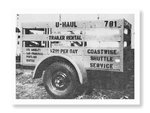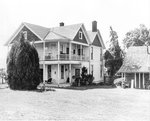



RIDGEFIELD – U-Haul Company will join Ridgefield’s Heritage Day festivities on Sat., Sept. 12 with a celebration of its own heritage as the company, which was started in a garage in post-World War II Ridgefield, turns 70 years old.
James Carty was the very first white settler in what is now Ridgefield; his family would become inextricably linked to the city’s early history. Two generations later, his great-nephew William Carty would become a long-serving Washington state legislator.
In 1945, when Anna Mary Carty and her husband L.S. “Sam” Shoen had trouble finding a way to transport their belongings from California back home to the Northwest, the experience led them to make a decision that would alter their lives and their family for generations.
Without a way to move their belongings, they were forced to keep only what they could pack into their car. On that long drive home, they came up with the idea for the trailer rental company that would become the ubiquitous U-Haul.
The company, now based in Phoenix, AZ, is several decades removed from Washington, but the Carty family descendants who still manage the self-moving giant yet retain a strong connection to the town where it began, said Stuart Shoen, L.S. and Anna Mary’s grandson and current executive vice president of U-Haul.
Shoen has worked for the company for more than 20 years – 25, he says, if you count delivering office mail as a 10-year-old. Today, he manages about a third of the company’s home office, he said. He grew up far away from Washington, but returned to Ridgefield throughout his youth to visit his family.
“Ridgefield is a really special place for me,” he said by phone Thursday morning. “It has this really mythical status … it was where everything sprouted from.”
Shoen credits the company’s success to the lessons and ethics learned from his grandparents’ early lives in the Pacific Northwest.
“Anna Mary and L.S. both had those types of values,” he said. “I think Anna Mary certainly got that from her experience of being in a big family on a farm and everybody having to pitch in. I think that was huge.
“I think we’ve been successful at U-Haul because L.S. and Anna Mary very early focused us on that; we didn’t focus on making money, we didn’t focus on having fancy offices or any of those things. We focused on helping people who needed help.”
Shoen recalled his shock as a child at the area’s lush green landscape. When an aunt once tasked the family children with gathering blackberries for a pie, Shoen said he couldn’t help but try some. After a while, he had eaten everything he gathered.
“I live in Phoenix and not much grows down here, and certainly nothing as delicious as blackberries,” he said. “It was a mind blowing experience as an 8-year-old to be able to just walk around and pick a berry … I went out to help pick berries for this pie and I just ate the profits, totally. I got myself so sick on berries.”
Today, U-Haul employs more than 20,000 people directly and contracts with 18,000 independent dealerships, a footprint that rivals fast food chains. The company operates 10 manufacturing plants and today owns more than 100,000 trailers and another 100,000 trucks, and owns about 4 million square feet of self-storage space.
Shoen traces it all back to his grandparents.
Anna Mary Carty Shoen passed away in 1956, only 11 years after U-Haul was founded. She never got to see the giant the company would become.
“We like to think of ourselves as a really progressive company in many ways and part of that history of being progressive starts with Anna Mary,” Shoen said. “She was at least 50/50 equally as critical to the founding of U-Haul as L.S. … U-Haul doesn’t exist without her and I think that a lot of us are really proud that we have a woman who is the reason we’re here.”
Shoen said the people who knew her called Anna Mary a “dynamo” who was able to help with company business while raising 6 children. In the early days, when L.S. spent long weeks on the road repairing trailers himself, dealers would send commission checks in to the company. Policy at the time instructed them to make the checks out to “A. M. Carty”, Shoen said, unaware the name belonged to a woman.
Whenever L.S., known to the dealers as “Sam the trailer repair man,” needed to relay some policy change or implement a new rule the dealers found annoying, he was known to deflect by saying “Yeah, well, I guess that’s just how A. M. Carty wants it. That’s the boss.”
“It made U-Haul seem like a bigger outfit than it was,” Shoen said. It was a way to give the company head a persona and a swagger to make people confident in his strong leadership, and it allowed L.S. to relate to the dealers in a more peer-oriented way.
Though she was crucial to its success, Shoen said he feels Anna Mary sometimes receives less credit than she deserves for U-Haul’s success.
“Neither of them could have done it alone,” he said.
“She was a woman for all seasons … a renaissance woman. That, for me, is what I love about U-Haul’s connection to Ridgefield. It’s her. She was from there, she never left there. She’s a person who is a real model in our family, in our company, and we really try to honor her … Because of her, our employees got to send their kids to college, got to pay for braces, and buy them shoes and take them on vacations and all of these things that families want to do. At the end of the day, that’s really what it’s all about.”